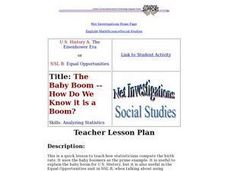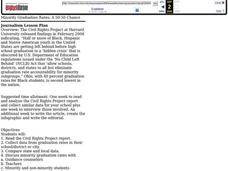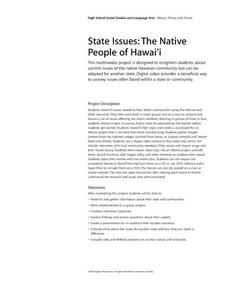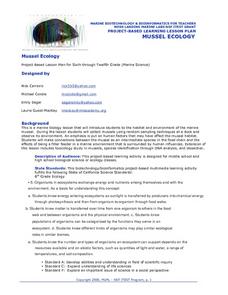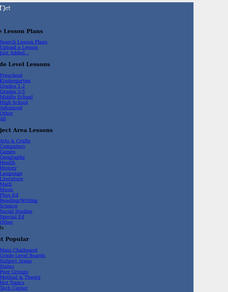Curated OER
Getting to Know You
Students converse with each other while playing a game in order to discover things that are alike and things that are different about themselves. The students gather data about themselves, organize and display data on the graph, and...
Curated OER
The Baby Boom -- How Do We Know it is a Boom?
Students examine graphs of three statistics and use basic math to compute their own. They evaluate the implications of manipulating data and whether statistics are appropriate for creating policy.
Curated OER
American Focus on World Constitutions
Upper graders read several passages to gain an understanding of the nations that have adopted a constitution similar to the United States Constitution. This is a scripted lesson that is intended to build content-specific vocabulary and...
Curated OER
American Focus on World Constitutions
Eighth graders describe essential components of a constitution and cite cultural factors affecting international law-making.
University of Chicago
Addressing Stereotypes
How is a stereotype defined, and what are some mechanisms we can use to combat negative stereotyping? Your young historians will discuss how and why stereotyping occurs, as well as consider the roots of modern conceptions of the Middle...
Curated OER
Organizing Principles of Plants and Animals
Three lessons and five assessments are contained in this material. Various paper shapes are sorted as a simulation of biological classification. Learners gather a list of living things that they are familiar with and design a...
Curated OER
Genetic Variability
Using black and white construction paper, evolutionary biologists simulate the classic peppered moth study. They use beans in a frequency and natural selection exercise. Finally, they analyze germinated seeds for variations. All three...
Curated OER
Minority Graduation Rates: A 50-50 Chance
High schoolers conduct research on issues and interests by generating ideas and questions and by posing problems. They gather, evaluate and synthesize data from a variety of sources. For this lesson the issue is minority graduation rates.
Curated OER
It's not as pretty as it looks!
Tenth graders investigate that measurement is often an inact science. They explore ways utilize available information to form hypotheses. Students investigate how to test hypotheses using the HACH test kits.
Curated OER
Cool Stuff I've Done!
Sixth graders reflect on the life experiences they have had and discover how those experiences may be classified on a resume. They begin brainstorming their life experiences and writing each one on a sticky note. At end of brainstorming...
Curated OER
Funerals and Burial Rites
Ninth graders research burial practices that originated in West Africa and then migrated to the South Carolina and Ohio. They compare and contrast burial practices in both places. As students collect information and data, they organize...
Curated OER
Word of the Day
Students use Internet to research definition of an assigned vocabulary word, and brainstorm ideas for how to teach the new word to classmates in an innovative way using a digital format.
Curated OER
State Issues: The Native People of Hawaii
Students research issues about their state and community. They work in groups to create a multi-media presentation highlighting the issues.
Curated OER
Youth voters and election turnout
Students investigate why 18- to 24- year-olds have a low turnout at the polls. Students develop a plan to encourage young Americans to vote, or write a persuasive essay telling why they should vote.
Curated OER
Mussel Ecology
Students are introduced to the marine environment of the mussel. The emphasis of the lesson is upon what human factors are present to influence the environment in positive and negative ways. They brainstorm in groups in order to conduct...
Curated OER
Flight of the Painted Ladies
Students explore the life cycle of the Painted Lady Butterfly. They set up cameras near a butterfly culture. They create an iPhoto photo book to document and journal their observations of the metamorphosis. Students produce a narrated...
Curated OER
Author In The Spotlight
Complete an in-depth study of the works or a specific author. Working in pairs, students read at least four works by the same author. After completing the reading, they create an essay comparing and contrasting the works and create an...
Curated OER
The Great Debate
Groups of learners investigate the persuasive genre of writing as they research and present on an issue. They research the Internet (possible websites are included) for a topic and locate information to present to the opposing team. In...
Curated OER
Stories of the American Experience
Students identify a veteran to interview. This could be a family member of one of students or someone contacted through an organization in the community. They use a storyboard to plan their movie about their subject.
Curated OER
Centers of the Storm: The Lyceum and the Circle at the University of Mississippi
Greek Revival architecture and the Civil Rights Movement? Sure! Examine how the Lyceum and Circle, two historic buildings located on the campus of the University of Mississippi, relate to integration and the 1962 riot on the university...
Curated OER
Writing Children's Literature
Young scholars examine the common themes and characteristics of children's literature. They develop a list of characteristics, read and discuss examples of children's literature, and create an original children's book.
Curated OER
Student Artist Screen Savers
Young scholars collect and compile digital photographs in order to create a screensaver slide show that show the artist and their work.
Curated OER
Watershed Documentary
Students conduct research and collect data about a local watershed area. They create an iMovie showing the human and natural impacts on the creek and watershed areas.
Curated OER
Early Voting, Other Election Changes are Possible
Students use the internet and linked sites to explore current voting methods in their community. They research suggestions that have been made for changes and interview people who made these suggestions (when possible). Students suggest...



